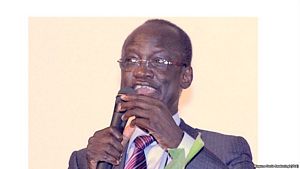|
By accessing or using The Crittenden Automotive Library™/CarsAndRacingStuff.com, you signify your agreement with the Terms of Use on our Legal Information page. Our Privacy Policy is also available there. |

In South Sudan, A Wait Too Long for Bridge Repairs
|
|---|
|
|
In South Sudan, A Wait Too Long for Bridge Repairs
Mugume Davis Rwakaringi, VOA News
26 March 2013 (12:28PM)
 Telar Deng, an advisor to South Sudanese President Salva Kiir, speaks at an event on Saturday, March 23, 2013, to raise money to fix two bridges on the road linking Kajokeji County and Juba. (VOA/Mugume Davis Rwakaringi) Telar Deng, an advisor to South Sudanese President Salva Kiir, speaks at an event on Saturday, March 23, 2013, to raise money to fix two bridges on the road linking Kajokeji County and Juba. (VOA/Mugume Davis Rwakaringi)
|
JUBA, SOUTH SUDAN — For five years, the residents of Kajokeji County in Central Equatoria have been waiting for the government to repair two bridges on the road that links them to Juba, 75 miles away.
But they've grown weary of waiting and, on Saturday, they took matters into their own hands and held a drive to raise money to repair the bridges themselves.
More than 800 people turned out, and the organizers of the fundraiser had 120,000 South Sudanese pounds, or about $30,000 in the kitty by the end of the day.
That's a healthy sum in a country where gross national income is less than $1,000 per year. But the money raised was still only a fraction of the estimated $625,000 it will cost to repair the bridges.
The two bridges, in Limu and Jomos near Juba, are quite simply falling apart. Residents say in the rainy season they are practically inaccessible and extremely dangerous.
Earlier this year, two revenue officers were killed when their car was washed off one of the bridges in a rainstorm.
Currently, traveling to Juba from Kajokeji takes around seven hours. Once the bridges are repaired, the trip is expected to take less than half as long -- around three hours.
Kajokeji resident Wudhu Simon Boboya says the dilapidated state of the bridges is hurting farmers, traders and the local economy.
“It has become very hard for the people of Kajokeji, especially the farmers, to transport their farm produce to Juba. Likewise, it has become [difficult] for business people to transport goods and services from Juba, and it has also made prices expensive in Kajokeji,” he said.
President Salva Kiir laid a cornerstone to mark the beginning of improvements to the road in 2008, but five years later, the road, and the bridges, are still in a sorry state.
On Saturday, Kiir donated 20,000 pounds, or $5,000, to the fundraiser.
His advisor, Telar Deng, attended the money-raising drive, and blamed the delay in repairing the road on cuts to the national budget following the decision to stop oil production last year.
South Sudan stopped pumping oil, the mainstay of its economy, in January last year amid a row with Sudan about fees for transporting crude and revenue sharing.
But earlier this month, Juba reached an agreement with Khartoum and ordered oil companies to resume production Exports are expected to restart in a few weeks.
The organizers of the fundraiser, meanwhile, are not counting on government support to fix the bridges. Five years has been too long to wait for action to be taken to repair the crumbling infrastructure, so they are actively mobilizing at churches and civic organizations in Central Equatoria to raise even more money andstart fixing the bridges themselves.


















